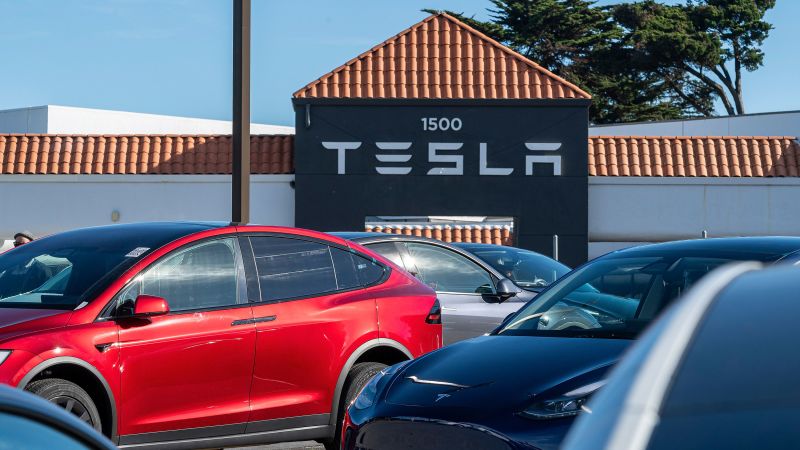Tesla reported record quarterly sales in the final three months of last year, but it wasn’t enough for it to hang onto its title as the world’s largest maker of electric vehicles.
The company reported global sales of 484,507 vehicles in the fourth quarter, a bit better than expected and up nearly 20% from what it sold in the same period of 2022. It was less than the 526,409 EVs sold by Chinese automaker BYD, but Tesla stayed ahead of BYD in total full-year sales. BYD vehicles are sold in Asia and Europe but are not yet available in North America.
Tesla is facing greater competition from not just BYD, but from established global automakers that are increasing their EV offerings and capacity.
Telsa’s near 20% growth is down from the higher growth rate earlier this year that gave it a 38% gain for the year. And that annual growth rate is well below the 50% annual growth target set by Tesla.
But the pace of growth in demand for EVs from consumers appears to be slowing for all brands, not just Tesla. Some of the legacy automakers, such as Ford and General Motors, have pulled back EV production in the near term, even though they’ve announced plans to shift from traditional gasoline-powered vehicles to EVs in the years ahead.
Tesla has responded to the growing competition and higher interest rates that have driven up the cost of ownership by cutting prices of its vehicles, a move that has kept sales increasing but has squeezed its profit margins.
Tesla also faces a headwind in that some of its vehicles, including some of its Model 3’s, have lost the full $7,500 federal tax credit as of Monday that had been available to many US buyers. There are limits to the tax credit for EVs using Chinese batteries or materials, even if the cars are assembled in a US factory. There are also limits on the tax credits for high-income buyers.
Tesla also faced some difficult headlines in recent months, including a recall ordered on 2 million cars, virtually all of the vehicles it had produced for the US, due to a federal regulator’s findings that its Autodrive feature posed a safety threat because it could be used away from the highways on which it is designed to be engaged.
Tesla CEO Elon Musk has also generated controversy this year for his comments and tweets, such one retweet claiming that Jewish communities push “hatred against Whites.” But while those controversies caused advertisers to flee X, the social media platform he owns formerly known at Twitter, it’s not clear that what impact, if any, it has had on Tesla sales.
The sales growth at Tesla is a good sign for the company according to Dan Ives, an analyst with Wedbush Securities who is a bull on Tesla shares.
“This was a clear win for [Tesla CEO Elon] Musk and Tesla as hitting 1.8 million vehicles for 2023 was a major achievement in a choppy macro for EVs,” he wrote in a note to clients Tuesday.
Shares of Tesla were little changed in premarket trading on the slightly better-than-expected sales news Tuesday. Tesla shares doubled in 2023, recapturing just over half the losses they suffered in 2022. But they’re down 15% from their 52-week high reached in July, and they lost 5% in just the closing days of December trading.
Read the full article here





